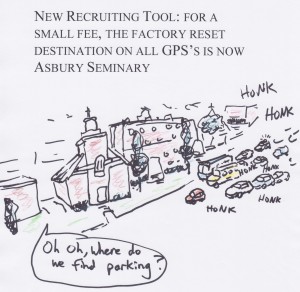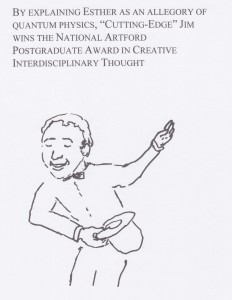Lots of PhD’s on the market these days … 🙁
Good cultural backgrounds helps us trust Scripture
Lots of skeptics today criticize the Bible, oblivious to the cultural setting that it was addressing. Instead of seeing how biblical texts improved values of their surrounding culture, skeptics condemn the Bible for not promoting twenty-first century values that (whether we agree with those values or not) no one had heard of in biblical times. When Christians read the Bible in an ahistorical way, ignoring the cultural settings that it originally addressed, we play into skeptics’ hands. Just as God communicated the divine message to people in their specific languages, God also communicated to them in concrete cultural settings. Recognizing those settings helps us reapply the Bible’s message more concretely and appropriately in our often different situations today. If you want to apply the Bible rightly, knowing the first situation helps you recognize what kinds of situations are and are not analogous today.
Father of nations and kings—Genesis 17:5-6
Sometimes people go around “confessing” things in “faith” that aren’t true, and such words have no effect. There is, however, someone who speaks and it is as good as done. As Lamentations declares, “Who speaks and it happens, unless the Lord has commanded it? Isn’t it from the Highest One’s decree that both harm and good issue forth?” (Lam 3:37-38).
When God declared to Abram, “I have made you a father of nations” (17:5), he referred to a future promise. God is referring to what will happen through Sarah (17:15-16), thus to something that in Genesis 17 still remains future. What matters, however, is not whether something has already happened, but whether God has decreed that it will happen. Some promises in the Bible are conditional, of course, but God states the condition here and Abraham follows it.
First, God states the promise he makes as part of the covenant (“As for me,” 17:4); God also makes a promise concerning Sarai (“As for Sarai,” 17:15). The condition for Abraham is clear: he and his descendants must be circumcised (“As for you,” 17:9-14).
God’s promise was not only that Abraham would become a father of nations, but that kings would descend from him (17:6). Again, he refers to Abraham’s line by Sarah, through their son Isaac: “kings of peoples” (plural) would descend from Sarah (17:16). Other rulers might descend from Abraham’s lines through Hagar (Ishmaelites), Keturah (Midianites and others), and from Abraham’s and Sarah’s relatives (peoples from Lot’s daughters). From Sarah, however, the only two peoples would be the Edomites and the Israelites. Jacob’s line, like Esau’s (36:31), would include many kings (35:11), most importantly in the Davidic dynasty. But Jacob would beget not only a nation but a community of nations (35:11). The ultimate Davidic ruler, the Messiah, would rule all nations (see Isa 11:10, 12).
Abraham obeyed his part of the covenant immediately (17:23), despite the pain if circumcision at his age (nearly one hundred, 17:1, 17, 24), and the pain of his followers. They needed a new leader who would succeed him, and this leader was promised by God. Often when God makes a promise there is a condition, and the condition often entails a cost. Those who genuinely believe what God has promised, however, will readily undertake any conditions to serve and please the God who watches over us.
In this chapter, we see God’s covenant faithfulness and his power to bring to pass what he promises. We also see the importance of obeying what God commands.
(This is part of a series of studies on Genesis; see e.g., Sodom; flood; creation; fall; God’s favor.)
GPS Seminary Recruitment Tool (cartoon)
Life for a refugee child
My son David
For those who are interested, here is the story of three-year-old David as a refugee child. David is my son (since he was three, fifteen years ago).
Michael Brown interviews Craig and Médine about Impossible Love
For those who are interested, an audio recording of the interview regarding Impossible Love (including some of Médine’s refugee experiences) is available for the date April 7 at http://www.lineoffireradio.com/2016/04/07/the-amazing-story-of-craig-and-medine-keener-impossible-love-and-the-irrationality-of-anti-semitism/
Frank Viola interviews Craig about Impossible Love
Impossible Love tells the story of Craig (as a person), with a special focus on his wife Médine’s experiences as a war refugee. Although a true account, it is narrated more in the style of an adventure story rather than in documentary style, so it is suitable for a wide audience.
Here is Frank Viola’s interview (on his blog)
For those interested in the book itself, here are a couple links: through CBD; through Amazon.
God heard her cry: God and Hagar in Genesis 16
God uses weak and fallible people—the only kind of people there are. Both Sarah, from the Middle East, and Hagar, from Egypt, were attached in special ways to Abraham, who had obeyed God’s call in faith. Each of them also believed in the same God that Abraham did. (At the very least, Hagar knows about God and when she hears from him she fully obeys him, 16:13.) They were each very much a part of their culture and the respective roles in which they found themselves, but God had a plan for both of them, as he does for each of us who look to him.
Yet even though Sarah was going to be blessed as a mother of the promised line, she resented Hagar’s arrogance against her (16:4) and she “afflicted” her even while she was pregnant (16:6). The affliction is so serious that Hagar seems willing to risk birthing by herself in the wilderness, undoubtedly with less means of subsequent sustenance than she envisioned (cf. 21:14-15; though she found a spring, 16:7).
More to the point of my narration, however, God heard her affliction (as the angel of the Lord indicates to her in 16:11, using the same Hebrew term as in 16:6). This is the same language used centuries later for God’s enslaved people in Egypt (Hagar’s country), when God saw their affliction and heard their cries (Exod 3:7; 4:31; Deut 26:7; cf. Neh 9:9). God hears when slaves and other oppressed people cry to him (cf. Exod 22:22-23, 26-27; Jms 5:4).
The Lord would bless her in part “because” of her affliction (Gen 16:11). In contrast to Israel, however Hagar is addressed as “Sarai’s maidservant” (16:8) and is sent back (Gen 16:9). Later she and her son will be sent into the wilderness again (21:14), but first her son would grow up in Abraham’s household and consequently with more blessings from Abraham than he likely would have had otherwise (17:20; 21:13).
Interestingly, Hagar receives a revelation from the Lord just as Abraham does; no such revelation is reported of Sarah until the messengers come in Gen 18:9-13 (cf. 17:15, 19, 21), and even then she is addressed only through Abraham. God has a special plan for Sarah, but we should not forget his care for Hagar as well. Indeed, as one of my former students, Sandra Randall, taught me, Hagar is the first person for whom Scripture mentions an explicit revelation of the angel of the LORD (16:7). The next time the angel of the Lord is mentioned by this title (he is probably implied in Gen 18), he is again appearing to Hagar in the wilderness, this time thirteen years later (21:17). (Of course the angel of the Lord also works behind the scenes, as implied in 24:7 and 48:16, but it seems no coincidence that the narrator mentions him where he does.) Moreover, this angel calls to her from heaven (21:17), as he will call to Abraham from heaven in the next chapter (22:11, 15, the first explicit mention of the angel of the Lord speaking to Abraham).
God heard her affliction, and she acknowledges him as “the God who sees,” marveling also that she has remained alive after seeing him (16:13). She seems already aware that no one can fully see God and live (Exod 33:20), but she is the first to discover that she could see some of the glory of the angel of the Lord, in whom God was revealed, and live (Judg 6:22-23; 13:22-23; cf. Exod 24:10-11).
It encourages me to see that even when we are enduring hardship—and sometimes are called to keep enduring it for a time—God does hear us, and has something better for us. The present is not all there is. Indeed, even when our role in God’s purposes may seem small to us, we may not imagine how much God is really with us and has plans for us. Granted, Hagar probably had some special favor with God because of her relationship with Abraham. But God has given us who trust him special favor with himself because of our relationship with Jesus Christ, his own Son.
(This is part of a series of studies on Genesis; see e.g., Sodom; flood; creation; fall; God’s favor.)






